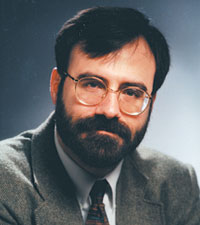The Importance of Fathers
By Wes Callihan
Printed in Practical Homeschooling #23, 1998.
 The father's example inspire a love or an apathy for learning, and thus his positive attitude is essential in the education of the sons.
The father's example inspire a love or an apathy for learning, and thus his positive attitude is essential in the education of the sons.

|
 |
 When the Victorian poet Robert Browning was five, he saw his father sitting in his reading chair, absorbed in a large volume. Little Robert asked him what it was, and his father replied, "The siege of Troy." The boy asked, "What's a siege and what's Troy?" His father stood up, put a chair on the table, plopped the little boy into it and said, "You are Priam, King of Troy," and proceeded to describe the Trojan War for the amusement of his son. The cat became Helen, the dogs Agamemnon and Menelaos, the stable boy Hector, and so forth. Young Robert was enchanted. A year or two later, seeing his son playing "Siege of Troy" with his friends, his father suggested reading the whole story in a translation of Homer, which the boy did with delight. Then his father suggested studying Greek so that he could read the story in the words of Homer himself, and by the time the boy was twelve he had read all of Homer in the original.
When the Victorian poet Robert Browning was five, he saw his father sitting in his reading chair, absorbed in a large volume. Little Robert asked him what it was, and his father replied, "The siege of Troy." The boy asked, "What's a siege and what's Troy?" His father stood up, put a chair on the table, plopped the little boy into it and said, "You are Priam, King of Troy," and proceeded to describe the Trojan War for the amusement of his son. The cat became Helen, the dogs Agamemnon and Menelaos, the stable boy Hector, and so forth. Young Robert was enchanted. A year or two later, seeing his son playing "Siege of Troy" with his friends, his father suggested reading the whole story in a translation of Homer, which the boy did with delight. Then his father suggested studying Greek so that he could read the story in the words of Homer himself, and by the time the boy was twelve he had read all of Homer in the original.
There are not many fathers like Browning's anymore. Classical education emphasizes the great literature of the past, and Christians above all should understand the necessity of knowing the past, for history is a record of God's work and man's response. But twentieth-century man believes that the past is irrelevant and that only the practical has value. Men, especially, are taught to feel the tyranny of the practical. Consequently, men often have more difficulty appreciating classical education than their wives do. But if fathers do not learn to love the old books of literature and history and the study of Latin and Greek, then their sons, who will be the next generation of family heads, will not learn to value them either, and we fathers will be guilty of perpetuating into the next generation the present unbiblical hatred of the past.
A Father's Example
In The Classical Tradition, Gilbert Highet speaks of "a class of teacher that we tend to forget, although we should remember them with admiration and affection. These are the fathers who introduced their sons to the great books and the beautiful languages of Greece and Rome, who awakened their interest, and helped them over the dry sands and stubborn fences, and studied along with them, until often the sons became famous men whom we admire as though they had produced themselves out of nothing. That is true fatherhood, not only to beget the body but to help in making the mind of your son."
Many fathers of whom we have records in Scripture and history are very poor examples of this; many shirked the duty of helping to make a son's mind. On the other hand, many fathers have been wonderful examples of devotion, willing to forego their own pleasure and sometimes their welfare, for that of their sons, because they have a vision for generations rather than for their own lives alone.
Isaac Casaubon, one of the great scholars of the Reformation, was learning Greek from his father at the age of nine. When news of the St. Bartholomew's day massacre of the French Protestants by the Catholics drove them to the hills, his father continued the lessons in a cave.
When the Renaissance essayist Montaigne was a child, his father hired a tutor who was fluent in Latin. He was required to speak only Latin to the boy, as was the rest of the family. Little Montaigne learned Latin as his native tongue, and for the rest of his life he read for pleasure in the ancient authors better than any scholar of the day. His father taught him Greek by making it a game, a private language they could use between them.
The father of Edmund Gosse, the Victorian poet and essayist, was a biologist. He took Edmund with him to the shores of the English coast where they examined the creatures living there. While there, his father heard Edmund trying to recite his Latin declensions, with which he had been having difficulty, and taking down his own old Vergil he began to repeat the first of Vergil's bucolic poems by memory. The little boy could not understand a word, but was overcome by the music of the lines, and went about repeating them to himself in a kind of glory: "as I hung over the tidal pools at the edge of the sea," says Gosse, "all my inner being used to ring out with the sound of 'formosam resonare doces Amaryllida siluas.'"
John Stuart Mill came from a large family which his father struggled to support by his writing. Mill's father began teaching him Greek when the boy was only three, and Latin when he was eight. Under his father's guidance, by the time Mill was twelve years old he had read, in the original languages, most of the Greek and Roman poets, philosophers, and historians. By his eighth year, Mill had read a dozen of the great English historians, including Gibbon's Decline and Fall of the Roman Empire. Mill's father walked an hour every morning for his health, and for ten years took John along, questioning him about his reading, explaining difficult points, and suggesting other reading for the boy to follow.
A Love of Learning
All of these fathers were deeply involved with their sons' mental growth, helping them in their studies or teaching the boys themselves. But more importantly, all of these fathers were themselves devoted to learning; they loved reading, conversation, and the company of other men who felt the same. If we want our sons to love learning, desire knowledge, and appreciate our intellectual inheritance, we must do what these fathers did: we must model it by loving, desiring, and appreciating those things ourselves. It is not enough for Mother to believe in the value of books and to love them; if Father despises learning, by word or simple apathy, whom will the son imitate? Very few fathers would say, "Learning's a waste of time, boy." But a great many say it very clearly by their apathy.
The most critical element in a son's education is not the curriculum he follows, but his father's attitude toward learning. The best curriculum is a father's choice of conversation at the dinner table, the questions he asks of his sons, the books he reads to them, and especially the books he reads late at night when no one is watching to see if he turns on the television.